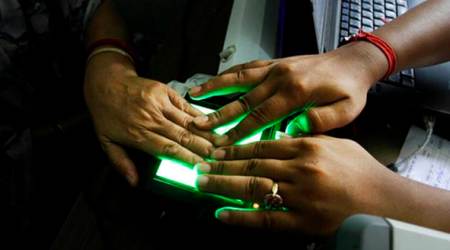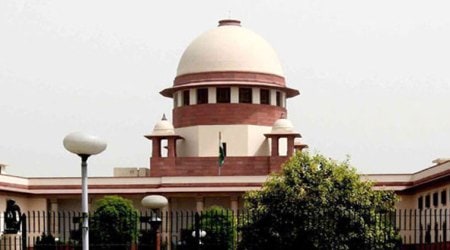 Supreme Court live updates: A nine-judge bench of the Supreme Court will decide if Indians have a fundamental right to privacy on Thursday. (File Photo)
Supreme Court live updates: A nine-judge bench of the Supreme Court will decide if Indians have a fundamental right to privacy on Thursday. (File Photo)
In a unanimous ruling, a nine-judge bench of the Supreme Court on Thursday upheld the right to privacy as a fundamental right under the Constitution. The top court overruled the previous judgments in the M P Sharma and Kharak Singh cases, which had found that the right to privacy was not protected by the Constitution. The bench observed that privacy is intrinsic to freedom of life and personal liberty guaranteed under Article 21 of the Constitution.
The bench, headed by Chief Justice of India J S Khehar, comprises Justices J Chelameswar, S A Bobde, R K Agrawal, R F Nariman, A M Sapre, D Y Chandrachud, S K Kaul and S Abdul Nazeer. The bench had reserved its verdict on the matter on August 2, after a marathon hearing spread over six days. The matter was referred to a constitution bench by a five-judge bench hearing a clutch of petitions challenging the Aadhaar Act.
The question of whether the right to privacy is a fundamental right guaranteed under the Constitution was first raised in the apex court before a three-judge bench. A batch of petitioners had challenged the Centre’s move to make Aadhaar mandatory to benefit from social and welfare schemes. The three-judge bench had referred the case to a larger bench on July 7, which was set up by the CJI. The five-judge Constitution bench had on July 18 decided to refer the matter to a nine-judge bench.
Here are live updates on the Supreme Court’s ruling on right to privacy:
2.00 pm: Congress vice-president Rahul Gandhi has reacted to the Supreme Court’s verdict on Twitter. He said, “Welcome the SC verdict upholding #RightToPrivacy as an intrinsic part of individual’s liberty, freedom & dignity. A victory for every Indian. SC decision marks a major blow to fascist forces. A sound rejection of the BJP’s ideology of suppression through surveillance.”
12.40 pm: In a press conference, former finance minister P Chidambaram welcomed the Supreme Court’s judgment on the right to privacy. Calling it a “landmark” judgment, he said the Aadhaar conceived by the UPA government was “perfectly compatible” with the right to privacy. “It is the interpretation of this government of the Article 21 which is an invasion of Right To Privacy,” he added.
12.15 pm: Kollywood actor Kamal Haasan tweeted, “SC upholds the right to privacy Nothing vague or amorphous about it. People thank the Honourable Judges. These are moments that make India.”
11.36 am: Delhi CM Arvind Kejriwal tweets, “Thank u SC for this v important judgement.” Click here for more reactions.
11.32 am: Odisha MP Thathagata Satpathy says “I adore the strength of this nation. Viva India”.
11.31 am: Former J&K chief minister Omar Abdullah has reacted to the judgment on Twitter, saying, “I have a right to privacy & it’s a fundamental one. Yeyy.”
11.29 am: Senior advocate in the SC, Salman Khurshid, tweets, “Privacy Fundamental Right has far reaching implications 4 our democracy. Celebrate the defeat of forces that wish to intrude in our lives. Hope cheer leaders remember the govt aggressively opposed Privacy Right before Court. Shall await ministers congratulating the PM for this.”
माटी कहे कुम्हार से तू क्या रोंदें मुओये, इक दिन ऐसा आए गा मैं रोनदो तोए
Warning of institutions of democracy to government of PM Modi— Salman Khurshid (@salman7khurshid) August 24, 2017
11.27 am: Former finance minister P Chidambaram takes to Twitter welcoming the SC’s ruling. He says, “Privacy is a fundamental right. The freedom that was won in 1947 has been enriched and enlarged. Privacy is the core of personal liberty. Article 21 has acquired a new magnificence.”
11.26 am: BJP’s Subramanian Swamy has tweeted, “Welcome the SC judgment that Right to Privacy is a fundamental Right under Article 21 of the Constitution. Now onto Aadhar modification.”
11.20 am: Congress spokesperson Randeep Surjewala has called the SC’s judgment “path-breaking”. Taking to Twitter, he said, “Path breaking & seminal judgement of Supreme Court declares ‘Privacy’ as fundamental right. A great victory for liberty & freedom. S.C rejects Modi Govt’s attempt to whittle down the right to privacy as a fundamental right by AG’s plea of no mention in Constitution.”
11.15 am: In response to the judgment, CPI(M)’s Sitaram Yechury has tweeted, “Congratulations to all lawyers, activists, others who fought this govt’s sinister designs to deny Indians their fundamental right to privacy. A far-reaching judgement which will have consequences in various domains, as technology is playing a greater role in our day-to-day lives. We have been opposed to mandatory Aadhaar, data misuse by foreign tech corporates. This judgement will pave the way for securing our rights.”
Congratulations to all lawyers, activists, others who fought this govt’s sinister designs to deny Indians their fundamental right to privacy http://t.co/mZJeL9Ax9U
— Sitaram Yechury (@SitaramYechury) August 24, 2017
11.10 am: In case you’re just joining us, a nine-judge bench of the Supreme Court, in a unanimous ruling, just ruled that the right to privacy is intrinsic to freedom of life and personal liberty as guaranteed under Article 19 of the Constitution. The bench overruled the two existing judgments by the court on privacy, one delivered by an eight-judge bench in 1954 (M P Sharma case) and the other by a six-judge bench in 1962 (Kharak Singh case).
11.00 am: Speaking to reporters, senior counsel Prashant Bhushan said, “The judgment doesn’t say anything about the right of citizens to share biometric details for Aadhaar. The nine-judge held that it is a fundamental right. Any law passed cannot infringe upon the reasonable restrictions on your right to privacy. If the government says Aadhaar will be required for travel and purchases then in my view these are unreasonable restrictions… it is a setback to the government as they said right to privacy is not a ‘wholly qualified’ right.”
10.52 am: Privacy is intrinsic to freedom of life and personal liberty guaranteed under Article 21 of the Constitution, the nine-judge bench ruled.
10.50 am: The top court’s previous decisions in the M P Sharma and Kharak Singh case “stand overruled”. The two judgments had found that right to privacy was not protected by the Constitution.
10.45 am: The nine-judge bench of the Supreme Court has held that privacy is a fundamental right under the Constitution.
10.41 am: The Supreme Court has held privacy as a fundamental right.
Privacy part of fundamental rights guaranteed under part 3 of Constitution: Supreme Court @IndianExpress
— Ananthakrishnan G (@axidentaljourno) August 24, 2017
10.40 am: The bench has assembled and will deliver the verdict shortly.
10.30 am: Here’s a profile of four young lawyers, who took it upon themselves to break down court proceedings and educate the public — mainly by live-tweeting and through blogs — on the legalese of the debate. Prasanna S, Apar Gupta, and Kritika Bhardwaj are assisting senior counsel Shyam Divan, who is representing four privacy petitioners, and Gautam Bhatia is assisting another senior lawyer, Arvind Datar, who is arguing for the Election Commission and for privacy as a fundamental right. Read: Rhodes scholar to Carnatic singer, meet 4 young lawyers in privacy fight
10.15 am: During the course of the hearing, the Supreme Court had at one point sought to know why citizens are wary of sharing personal information with the State, but have no problem in doing so with private companies. Justice D Y Chandrachud had observed, “When someone uses an iPhone or iPad with fingerprint login, their personal details are already in the public realm… Is there something qualitatively different when the State does the same (seek personal information)?”
10.02 am: In an opinion column in The Indian Express, Alok Prasanna Kumar provides a definition of privacy: “Privacy is not only about hiding something or keeping it secret. It is, at its core, the right to be left alone. It doesn’t mean that one is withdrawing from society. It is an expectation that society will not interfere in the choices made by the person so long as they do not cause harm to others. It means that one’s right to eat whatever one chooses, the right to drink what one chooses, the right to love and marry whom one chooses, to wear what one chooses, among others, are rights which the state cannot interfere with.” You can read his entire piece here.
The Bengaluru-based author is a senior resident fellow at the Vidhi Centre for Legal Policy.
10.00 am: The Centre, which argued against privacy being a “wholly qualified” fundamental right, had said it would be subject to reasonable restrictions, just like other fundamental rights. Attorney General K K Venugopal said, “Since the right to privacy consists of diverse aspects and is a sub-species of the right to liberty, every aspect of sub-species will not qualify as a fundamental right”. Read more here.
9.55 am: Here are some observations which were made during the marathon six-day hearing: Senior counsel Gopal Subramanium, who argued for declaring privacy a fundamental right, had said, “…privacy was embedded in the expressions liberty and dignity as appearing in the Preamble to the Constitution. Liberty is inalienable… all choices are a part of the exercise of liberty… humans cannot exist without liberty… liberty is heart and soul of the Constitution.”
Senior counsel Soli Sorabjee, who also argued for declaring privacy a fundamental right, had said, “Non-mentioning of privacy rights explicitly in the fundamental rights does not signify it does not exist. It can be deduced from other fundamental rights mentioned in Part III of the Constitution. Freedom of press too was not mentioned but deduced so.”
9.45 am: Ahead of the apex court’s ruling on privacy, here’s a quick look at two existing judgments of the court on privacy. An eight-judge bench in 1954 (M P Sharma case) and six-judge bench in 1962 (Kharak Singh case) ruled that there was no fundamental right to privacy in the Constitution.
In the first case, the aggrieved parties had challenged the constitutional validity of conducting searches and raids on their property and their private records being taken away. But the eight-judge bench ruled: “…a power of search and seizure is, in any system of jurisprudence, an overriding power of the State for the protection of social security and that power is necessarily regulated by law.”
In the second case in 1962, the petitioner challenged the constitutional validity of Chapter XX of the Uttar Pradesh Police Regulations, which allowed authorities to open a “history sheet” against him, despite lack of evidence, and bring him under “surveillance”. The six-judge bench had held that “the right of privacy is not a guaranteed right under our Constitution, and therefore the attempt to ascertain the movements of an individual is merely a manner in which privacy is invaded and is not an infringement of a fundamental right guaranteed in Part III (fundamental rights)”.
Read more: M P Sharma and Kharak Singh: The cases in which SC ruled on privacy
9.30 am: Welcome to our live blog on the Supreme Court’s ruling on the right to privacy where we’ll be tracking all the developments inside and outside court.

